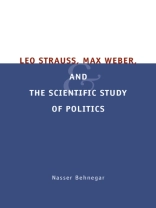Can politics be studied scientifically, and if so, how? Assuming it is impossible to justify values by human reason alone, social science has come to consider an unreflective relativism the only viable basis, not only for its own operations, but for liberal societies more generally. Although the experience of the sixties has made social scientists more sensitive to the importance of values, it has not led to a fundamental reexamination of value relativism, which remains the basis of contemporary social science. Almost three decades after Leo Strauss’s death, Nasser Behnegar offers the first sustained exposition of what Strauss was best known for: his radical critique of contemporary social science, and particularly of political science.Behnegar’s impressive book argues that Strauss was not against the scientific study of politics, but he did reject the idea that it could be built upon political science’s unexamined assumption of the distinction between facts and values. Max Weber was, for Strauss, the most profound exponent of values relativism in social science, and Behnegar’s explication artfully illuminates Strauss’s critique of Weber’s belief in the ultimate insolubility of all value conflicts.Strauss’s polemic against contemporary political science was meant to make clear the contradiction between its claim of value-free premises and its commitment to democratic principles. As Behnegar ultimately shows, values the ethical component lacking in a contemporary social science are essential to Strauss’s project of constructing a genuinely scientific study of politics.
Nasser Behnegar
Leo Strauss, Max Weber, and the Scientific Study of Politics [PDF ebook]
Leo Strauss, Max Weber, and the Scientific Study of Politics [PDF ebook]
Kup ten ebook, a 1 kolejny otrzymasz GRATIS!
Język Angielski ● Format PDF ● ISBN 9780226821160 ● Wydawca University of Chicago Press ● Opublikowany 2021 ● Do pobrania 3 czasy ● Waluta EUR ● ID 7969663 ● Ochrona przed kopiowaniem Adobe DRM
Wymaga czytnika ebooków obsługującego DRM












